Giving and Taking at Wharton: An Analysis Based on Adam Grant's Model
VerifiedAdded on 2023/05/29
|5
|1060
|251
Essay
AI Summary
This essay examines Adam Grant's framework of 'givers, takers, and matchers' in the context of the Wharton MBA program. The author identifies as a 'giver,' citing personal experiences such as managing a family crisis after the loss of his father and brother, and professional experiences involving mentorship programs at Texas Instruments. He intends to leverage the Wharton community to continue giving back through mentorship, sharing skills, and promoting policies that support giving back. The author emphasizes the value of mentorship for young professionals and aims to influence peers to adopt giving back practices within their respective organizations, utilizing his experiences and the Wharton network to make a positive impact. The essay also briefly touches upon time management strategies to balance work, family, and the demands of the MBA program, drawing on past experiences of overcoming challenges and maintaining commitments.
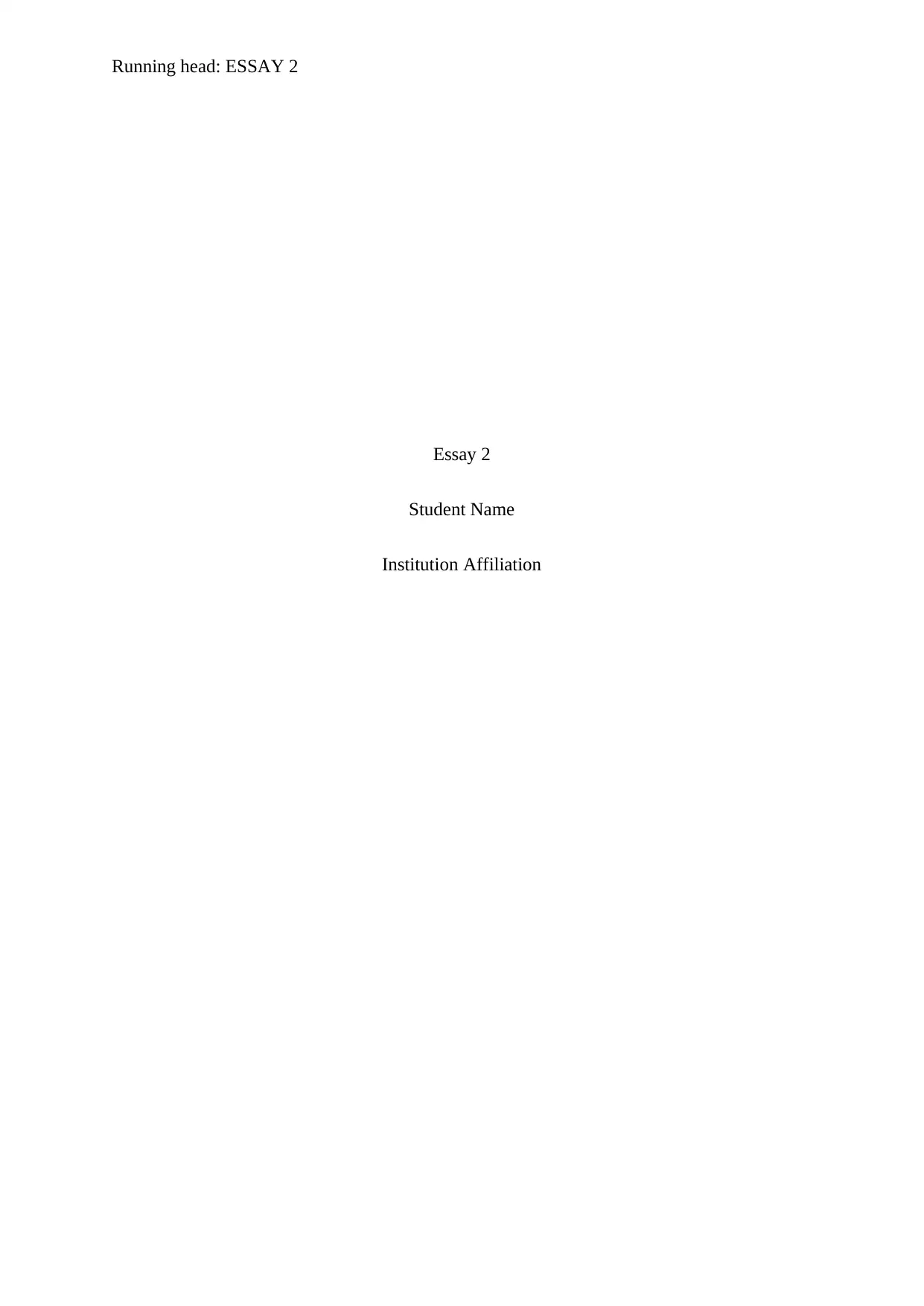
Running head: ESSAY 2
Essay 2
Student Name
Institution Affiliation
Essay 2
Student Name
Institution Affiliation
Paraphrase This Document
Need a fresh take? Get an instant paraphrase of this document with our AI Paraphraser
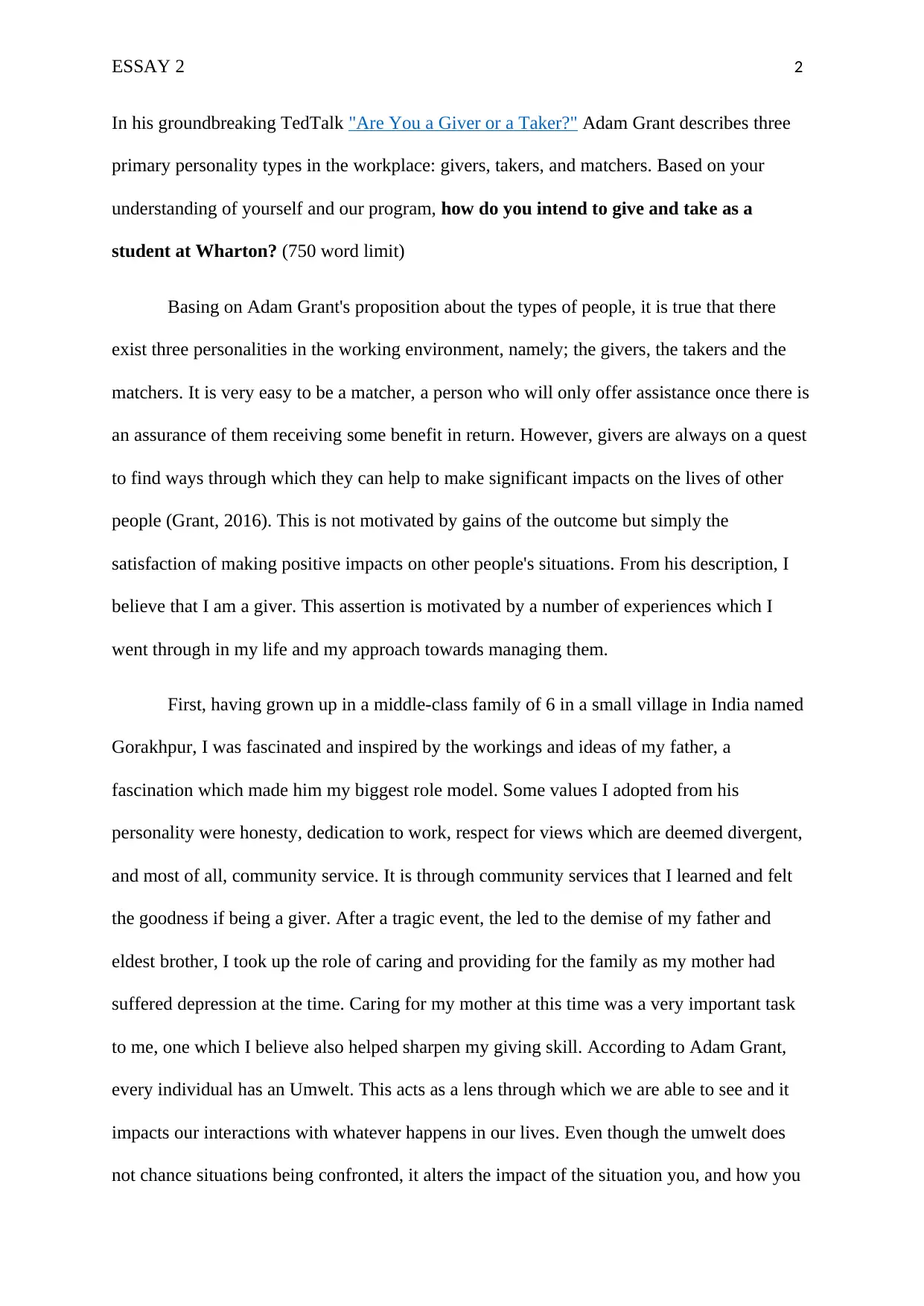
ESSAY 2 2
In his groundbreaking TedTalk "Are You a Giver or a Taker?" Adam Grant describes three
primary personality types in the workplace: givers, takers, and matchers. Based on your
understanding of yourself and our program, how do you intend to give and take as a
student at Wharton? (750 word limit)
Basing on Adam Grant's proposition about the types of people, it is true that there
exist three personalities in the working environment, namely; the givers, the takers and the
matchers. It is very easy to be a matcher, a person who will only offer assistance once there is
an assurance of them receiving some benefit in return. However, givers are always on a quest
to find ways through which they can help to make significant impacts on the lives of other
people (Grant, 2016). This is not motivated by gains of the outcome but simply the
satisfaction of making positive impacts on other people's situations. From his description, I
believe that I am a giver. This assertion is motivated by a number of experiences which I
went through in my life and my approach towards managing them.
First, having grown up in a middle-class family of 6 in a small village in India named
Gorakhpur, I was fascinated and inspired by the workings and ideas of my father, a
fascination which made him my biggest role model. Some values I adopted from his
personality were honesty, dedication to work, respect for views which are deemed divergent,
and most of all, community service. It is through community services that I learned and felt
the goodness if being a giver. After a tragic event, the led to the demise of my father and
eldest brother, I took up the role of caring and providing for the family as my mother had
suffered depression at the time. Caring for my mother at this time was a very important task
to me, one which I believe also helped sharpen my giving skill. According to Adam Grant,
every individual has an Umwelt. This acts as a lens through which we are able to see and it
impacts our interactions with whatever happens in our lives. Even though the umwelt does
not chance situations being confronted, it alters the impact of the situation you, and how you
In his groundbreaking TedTalk "Are You a Giver or a Taker?" Adam Grant describes three
primary personality types in the workplace: givers, takers, and matchers. Based on your
understanding of yourself and our program, how do you intend to give and take as a
student at Wharton? (750 word limit)
Basing on Adam Grant's proposition about the types of people, it is true that there
exist three personalities in the working environment, namely; the givers, the takers and the
matchers. It is very easy to be a matcher, a person who will only offer assistance once there is
an assurance of them receiving some benefit in return. However, givers are always on a quest
to find ways through which they can help to make significant impacts on the lives of other
people (Grant, 2016). This is not motivated by gains of the outcome but simply the
satisfaction of making positive impacts on other people's situations. From his description, I
believe that I am a giver. This assertion is motivated by a number of experiences which I
went through in my life and my approach towards managing them.
First, having grown up in a middle-class family of 6 in a small village in India named
Gorakhpur, I was fascinated and inspired by the workings and ideas of my father, a
fascination which made him my biggest role model. Some values I adopted from his
personality were honesty, dedication to work, respect for views which are deemed divergent,
and most of all, community service. It is through community services that I learned and felt
the goodness if being a giver. After a tragic event, the led to the demise of my father and
eldest brother, I took up the role of caring and providing for the family as my mother had
suffered depression at the time. Caring for my mother at this time was a very important task
to me, one which I believe also helped sharpen my giving skill. According to Adam Grant,
every individual has an Umwelt. This acts as a lens through which we are able to see and it
impacts our interactions with whatever happens in our lives. Even though the umwelt does
not chance situations being confronted, it alters the impact of the situation you, and how you
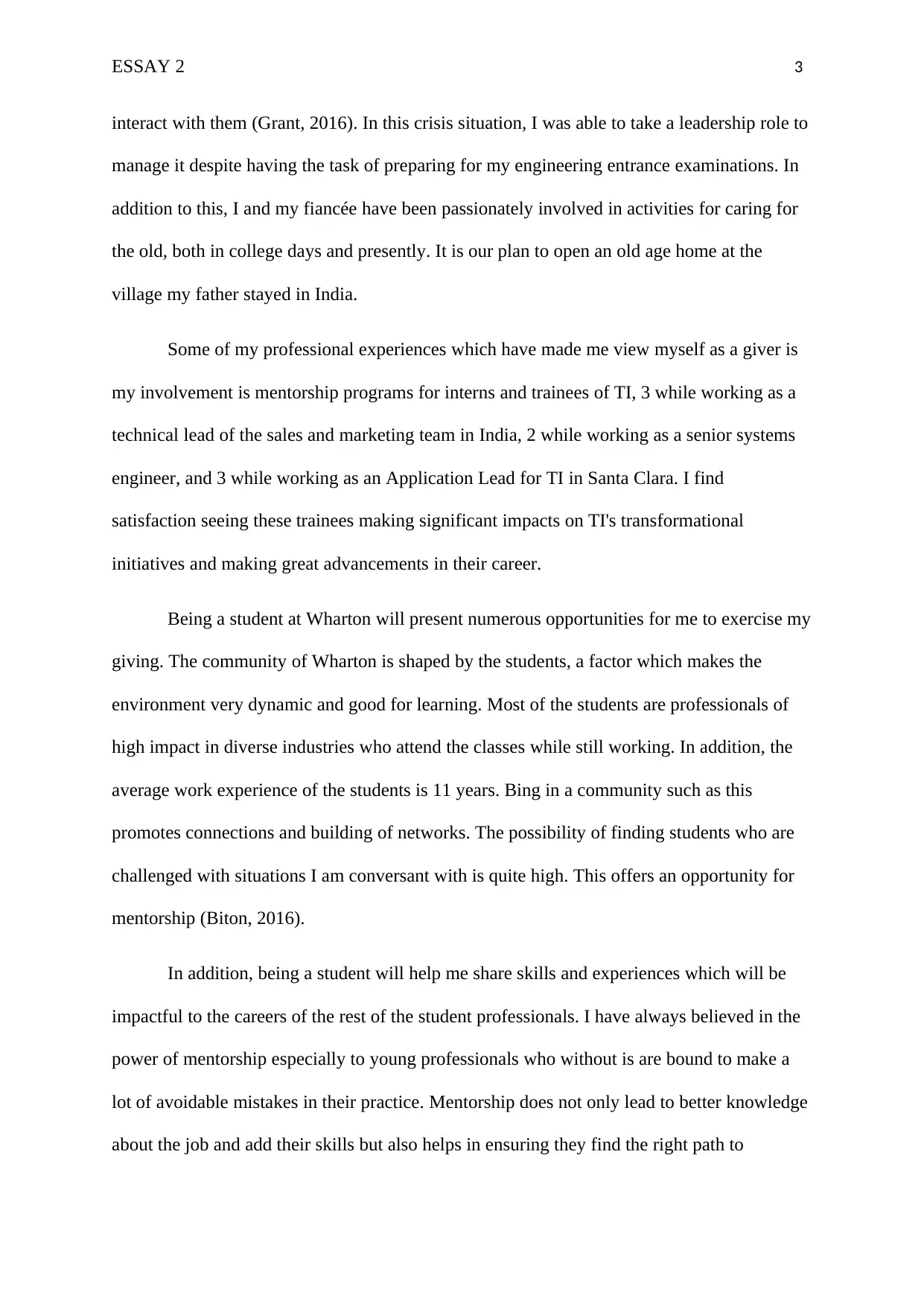
ESSAY 2 3
interact with them (Grant, 2016). In this crisis situation, I was able to take a leadership role to
manage it despite having the task of preparing for my engineering entrance examinations. In
addition to this, I and my fiancée have been passionately involved in activities for caring for
the old, both in college days and presently. It is our plan to open an old age home at the
village my father stayed in India.
Some of my professional experiences which have made me view myself as a giver is
my involvement is mentorship programs for interns and trainees of TI, 3 while working as a
technical lead of the sales and marketing team in India, 2 while working as a senior systems
engineer, and 3 while working as an Application Lead for TI in Santa Clara. I find
satisfaction seeing these trainees making significant impacts on TI's transformational
initiatives and making great advancements in their career.
Being a student at Wharton will present numerous opportunities for me to exercise my
giving. The community of Wharton is shaped by the students, a factor which makes the
environment very dynamic and good for learning. Most of the students are professionals of
high impact in diverse industries who attend the classes while still working. In addition, the
average work experience of the students is 11 years. Bing in a community such as this
promotes connections and building of networks. The possibility of finding students who are
challenged with situations I am conversant with is quite high. This offers an opportunity for
mentorship (Biton, 2016).
In addition, being a student will help me share skills and experiences which will be
impactful to the careers of the rest of the student professionals. I have always believed in the
power of mentorship especially to young professionals who without is are bound to make a
lot of avoidable mistakes in their practice. Mentorship does not only lead to better knowledge
about the job and add their skills but also helps in ensuring they find the right path to
interact with them (Grant, 2016). In this crisis situation, I was able to take a leadership role to
manage it despite having the task of preparing for my engineering entrance examinations. In
addition to this, I and my fiancée have been passionately involved in activities for caring for
the old, both in college days and presently. It is our plan to open an old age home at the
village my father stayed in India.
Some of my professional experiences which have made me view myself as a giver is
my involvement is mentorship programs for interns and trainees of TI, 3 while working as a
technical lead of the sales and marketing team in India, 2 while working as a senior systems
engineer, and 3 while working as an Application Lead for TI in Santa Clara. I find
satisfaction seeing these trainees making significant impacts on TI's transformational
initiatives and making great advancements in their career.
Being a student at Wharton will present numerous opportunities for me to exercise my
giving. The community of Wharton is shaped by the students, a factor which makes the
environment very dynamic and good for learning. Most of the students are professionals of
high impact in diverse industries who attend the classes while still working. In addition, the
average work experience of the students is 11 years. Bing in a community such as this
promotes connections and building of networks. The possibility of finding students who are
challenged with situations I am conversant with is quite high. This offers an opportunity for
mentorship (Biton, 2016).
In addition, being a student will help me share skills and experiences which will be
impactful to the careers of the rest of the student professionals. I have always believed in the
power of mentorship especially to young professionals who without is are bound to make a
lot of avoidable mistakes in their practice. Mentorship does not only lead to better knowledge
about the job and add their skills but also helps in ensuring they find the right path to
⊘ This is a preview!⊘
Do you want full access?
Subscribe today to unlock all pages.

Trusted by 1+ million students worldwide
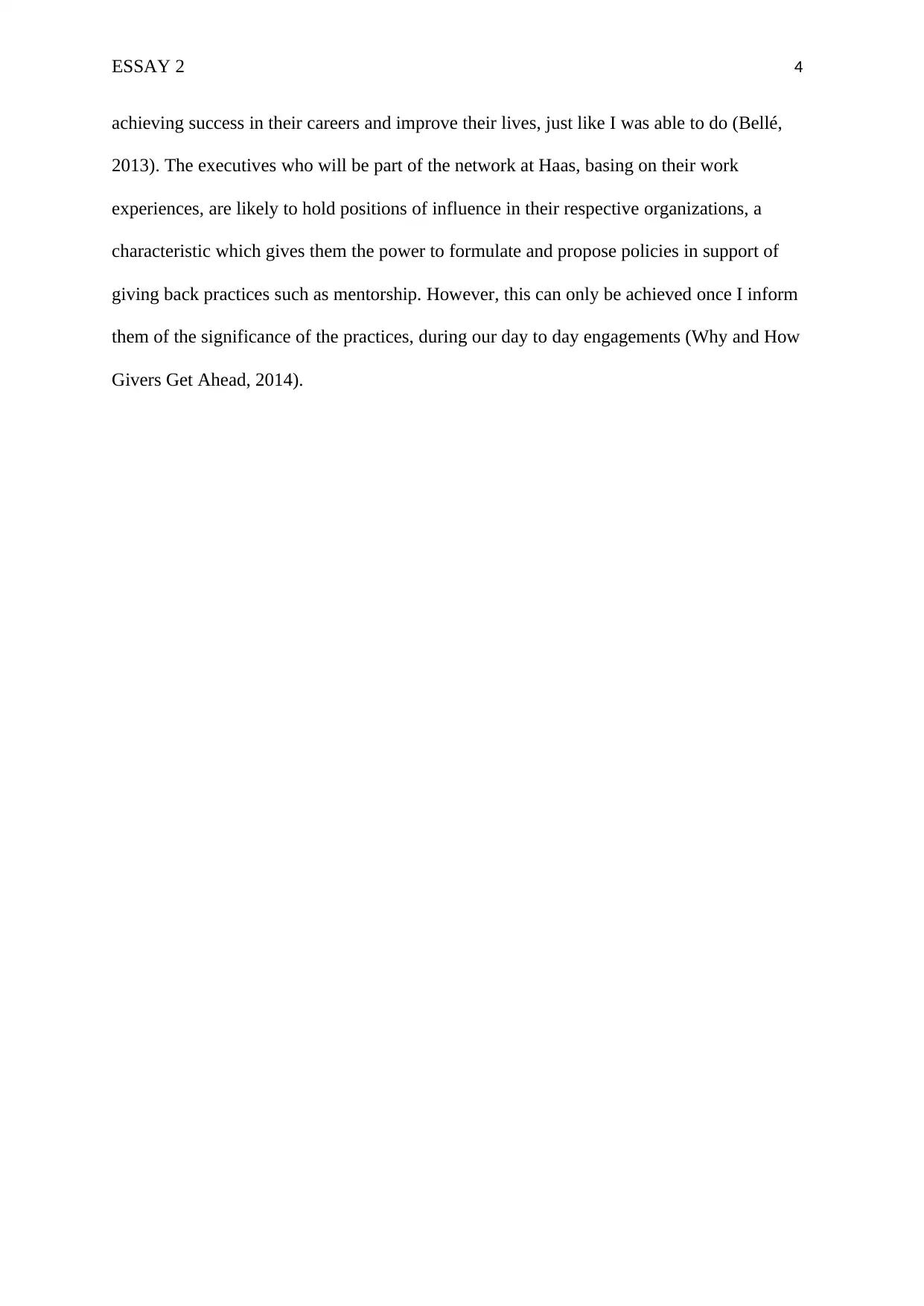
ESSAY 2 4
achieving success in their careers and improve their lives, just like I was able to do (Bellé,
2013). The executives who will be part of the network at Haas, basing on their work
experiences, are likely to hold positions of influence in their respective organizations, a
characteristic which gives them the power to formulate and propose policies in support of
giving back practices such as mentorship. However, this can only be achieved once I inform
them of the significance of the practices, during our day to day engagements (Why and How
Givers Get Ahead, 2014).
achieving success in their careers and improve their lives, just like I was able to do (Bellé,
2013). The executives who will be part of the network at Haas, basing on their work
experiences, are likely to hold positions of influence in their respective organizations, a
characteristic which gives them the power to formulate and propose policies in support of
giving back practices such as mentorship. However, this can only be achieved once I inform
them of the significance of the practices, during our day to day engagements (Why and How
Givers Get Ahead, 2014).
Paraphrase This Document
Need a fresh take? Get an instant paraphrase of this document with our AI Paraphraser
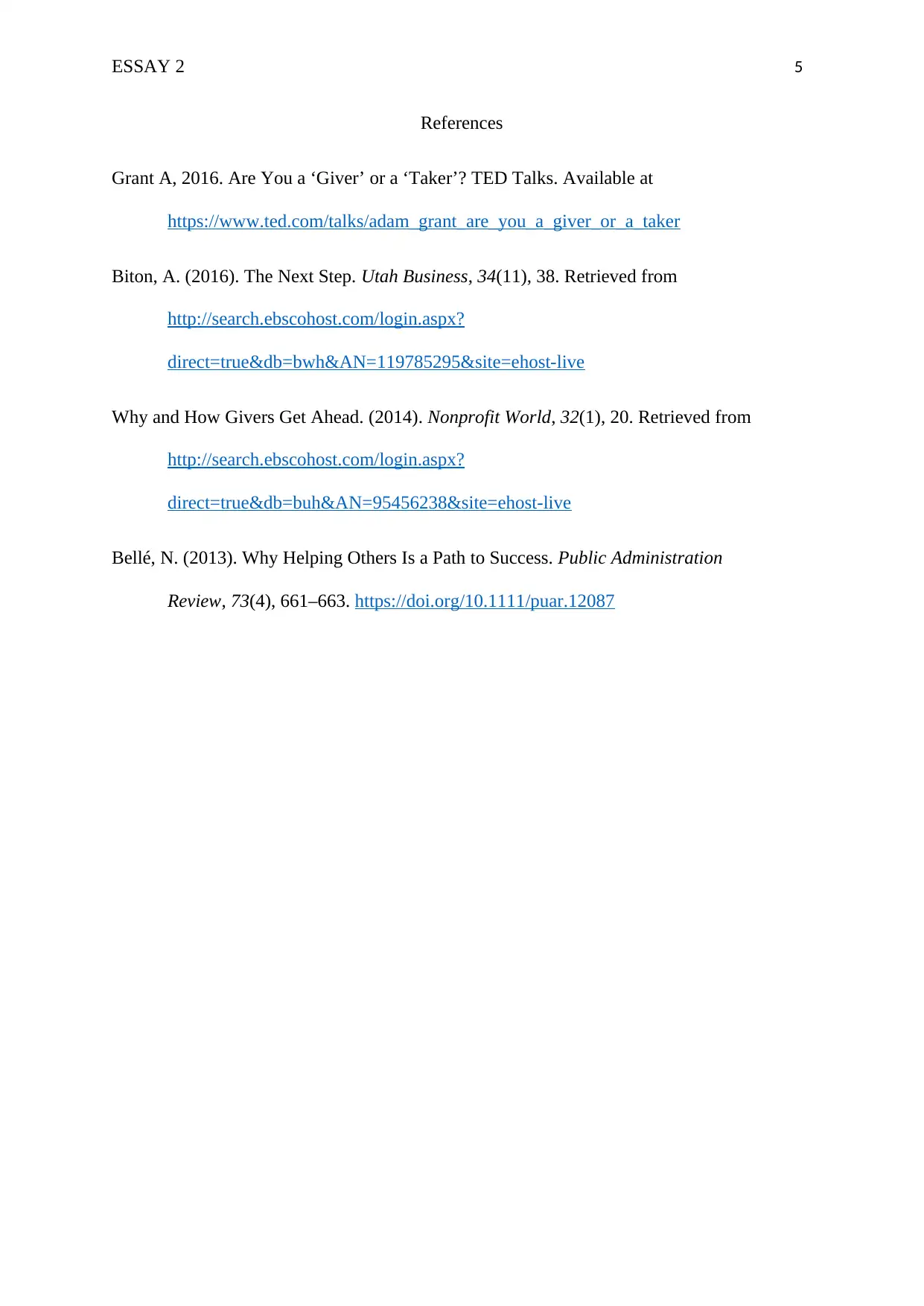
ESSAY 2 5
References
Grant A, 2016. Are You a ‘Giver’ or a ‘Taker’? TED Talks. Available at
https://www.ted.com/talks/adam_grant_are_you_a_giver_or_a_taker
Biton, A. (2016). The Next Step. Utah Business, 34(11), 38. Retrieved from
http://search.ebscohost.com/login.aspx?
direct=true&db=bwh&AN=119785295&site=ehost-live
Why and How Givers Get Ahead. (2014). Nonprofit World, 32(1), 20. Retrieved from
http://search.ebscohost.com/login.aspx?
direct=true&db=buh&AN=95456238&site=ehost-live
Bellé, N. (2013). Why Helping Others Is a Path to Success. Public Administration
Review, 73(4), 661–663. https://doi.org/10.1111/puar.12087
References
Grant A, 2016. Are You a ‘Giver’ or a ‘Taker’? TED Talks. Available at
https://www.ted.com/talks/adam_grant_are_you_a_giver_or_a_taker
Biton, A. (2016). The Next Step. Utah Business, 34(11), 38. Retrieved from
http://search.ebscohost.com/login.aspx?
direct=true&db=bwh&AN=119785295&site=ehost-live
Why and How Givers Get Ahead. (2014). Nonprofit World, 32(1), 20. Retrieved from
http://search.ebscohost.com/login.aspx?
direct=true&db=buh&AN=95456238&site=ehost-live
Bellé, N. (2013). Why Helping Others Is a Path to Success. Public Administration
Review, 73(4), 661–663. https://doi.org/10.1111/puar.12087
1 out of 5
Related Documents
Your All-in-One AI-Powered Toolkit for Academic Success.
+13062052269
info@desklib.com
Available 24*7 on WhatsApp / Email
![[object Object]](/_next/static/media/star-bottom.7253800d.svg)
Unlock your academic potential
Copyright © 2020–2026 A2Z Services. All Rights Reserved. Developed and managed by ZUCOL.





